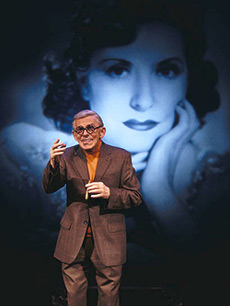
It must be a thankless task for an actor to impersonate another performer. Yet Frank Gorshin has been doing it for years, imitating everybody from Ed Sullivan to Marlon Brando. And if you're unlucky, you may remember him as The Riddler in the Batman TV series. His latest work is the one-man show Say Goodnight, Gracie (subtitled, believe it or not, "The life, laughter, and love of George Burns") a monologue by Rupert Holmes, which I saw in previews.
The premise is that Burns has just died and is auditioning for a role in heaven (he gets the job, needless to say). He talks for ninety minutes, with images projected on to the wall behind him. The autobiography is so flooded with jokes that we never know what we can believe; a story will turn out to be a set-up for the tag line. That's pretty clever, and a lot of the jokes are pretty funny.
Nathan Birnbaum's (George Burns') life began on New York's Lower East Side in 1896, and ended a few weeks after his hundredth birthday. His career ran through vaudeville, radio, and finally television. The two streams intersected early on when he met a young Irish girl named Gracie Allen, and, quite rightly, she's the focus of the monologue. "I had a talent," Burns says, "and I married her."
Now, I'm a great admirer of solo biographical shows; they entertain and teach. But should they ever be written about performers? Say Goodnight, Gracie cheapens George Burns; it packages his voice and mannerisms. Gorshin tries so hard to be funny that it's irritating and self-congratulatory. Burns made contact with the audience to comment on Allen; Gorshin makes contact with the audience as if to beg, "Look at me! Isn't this funny! What timing!"
Here and there, there's an intriguing comment on performing. While the audience laughed at Allen's punch line, Burns looked at the audience; Allen looked at Burns. "As far as she was concerned, we were having a conversation," Burns tells us. But the show ultimately teaches nothing about either the individuals, or about the theater.
Really, a script like this can't fail to please some of us. The audience was made up largely of late middle-agers who remember Burns and Allen, and they loved the show. They weren't applauding for the theater experience per se; they were clapping for a cultural icon, Gracie Allen, and for all the nostalgic associations they have with her. Say Goodnight Gracie might have made a first-rate 45-minute cabaret act, but Broadway doesn't become it. >
